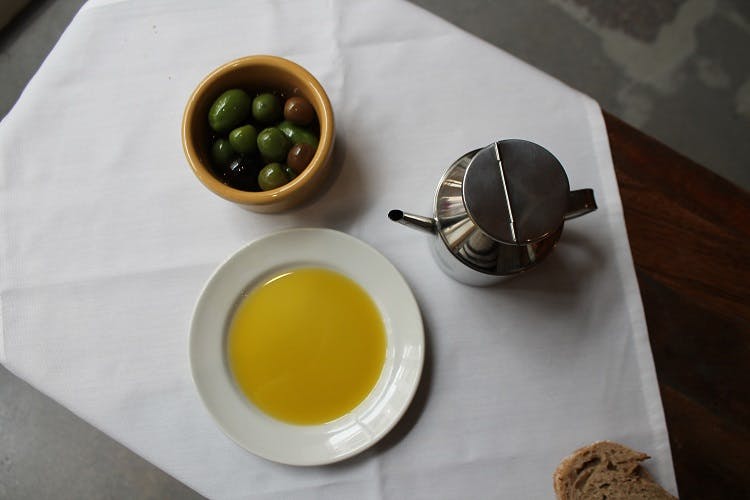Have you ever wondered why some olive oils are labeled "extra virgin" and others are not? While this designation may seem small, there is a world of difference between non-extra virgin olive oil and those with extra virgin status. So, what does extra virgin olive oil mean?
Extra virgin olive oil is the highest grade of olive oil you can get. To be considered “extra virgin,” European law stipulates that it must be made in a certain way and have certain characteristics.

PRESSING
Extra virgin olive oil must be made exclusively from the first, cold press. It can be pressed only by mechanical methods of separation (no chemicals), such as a hydraulic press or a centrifuge.
CHEMICAL-FREE
Extra virgin olive oil cannot contain any chemical substances. It must be 100% pure olive "juice." This is, in part, what makes extra virgin olive oil one of the healthiest oils out there.
ACIDITY
Before bottling, the oil is tested for acidity. In order to pass the test, it must have an acidity level lower than 0.8%, although many high-quality olive oils from Italy have an even lower acidity level (some as low as .1%)! For comparison, non-extra virgin olive oils can have acidity levels anywhere between 0.8 and 2%. Acidity greatly affects the flavor of the end product, so this is a crucial aspect of the testing phase.
NO DEFECTS
There are three main enemies of extra virgin olive oil: light, heat, and oxygen. Any of these factors could affect the olive oil during production (and post-production), causing it to have some kind of sensorial defects. For this reason, the olive oil is tested first to make sure nothing is off before it's bottled and labeled "extra virgin."
A HIGHER STANDARD
All of our extra virgin olive oil is produced in Italy from small artisan producers that are selected by our buyers in Eataly Italia. Even if all the extra virgin olive oils we sell are made in Italy and controlled by our buyers, some bottles will have an additional stamp with a code number on the label indicating the oil is DOP or IGP-certified. These seals are released by the EU in order to guarantee, control and protect the products and transparency for the customer.
DOP, or "Protected Designation of Origin": The DOP label guarantees that the extra virgin olive oil is produced, processed, and packaged in a specific geographical zone and according to tradition. Each step, from production to packaging, is regulated by rules set out in a disciplinare, or disciplinary text.
IGP, or "Protected Geographical Indication": The IGP label shows that the quality or reputation of the extra virgin is linked to the place or region where it is produced, processed, or prepared.
While both the IGP and DOP food certifications are hard to achieve, the main difference is that a DOP designation has stricter rules than the IGP designation. On Eataly.com, each bottle will specify if it is an IGP or DOP product, and there will be an official stamp on the bottle. Look for these symbols as you shop!
Explore our selection of extra virgin olive oil on Eataly.com or find your local Eataly to shop in-store.